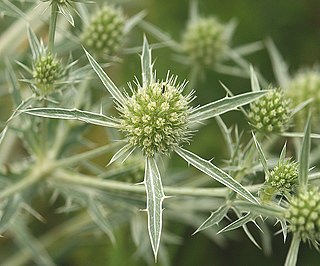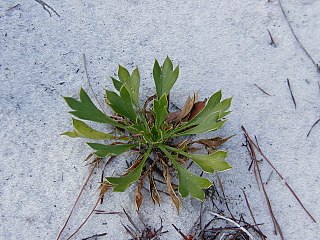
Eryngium is a genus of flowering plants in the family Apiaceae. There are about 250 species. The genus has a cosmopolitan distribution, with the center of diversity in South America. Common names include eryngo and sea holly.

Muş Province is a province in eastern Turkey. Its area is 8,718 km2, and its population is 399,202 (2022), down from 453,654 in 2000. The provincial capital is the city of Muş. Another town in Muş province, Malazgirt (Manzikert), is famous for the Battle of Manzikert of 1071.

Eryngium maritimum, the sea holly or sea eryngo, or sea eryngium, is a perennial species of flowering plant in the family Apiaceae and native to most European coastlines. It resembles a plume thistle in appearance on account of its burr-shaped flower. Despite its common name, it is not taxonomically related to true holly, but is an umbellifer.

Eryngium alpinum, the alpine sea holly, alpine eryngo or queen of the Alps, is a herbaceous perennial plant in the family Apiaceae.

Eryngium campestre, known as field eryngo, or Watling Street thistle, is a species of Eryngium, which is used medicinally. A member of the family Apiaceae, eryngo is a hairless, thorny perennial plant. The leaves are tough and stiff, whitish-green. The basal leaves are long-stalked, pinnate and spiny. The leaves of this plant are mined by the gall fly, Euleia heraclei.

Archon apollinus, the false Apollo, is a species of butterfly belonging to the Parnassinae subfamily.

Eryngium giganteum, with the common name Miss Willmott's ghost, is a species of flowering plant in the family Apiaceae.
Western Australia has relatively few species of moss; the most recent census found just 192 taxa. This represents just 10% of Australia's total moss flora, even though Western Australia accounts for about one third of the Australia by area. This relatively low diversity has been attributed to the lack of rainforest in the state.

The Loch Lomond Vernal Pool Ecological Reserve is a nature reserve of 8.22 acres (33,300 m2) in the community of Loch Lomond in Lake County, California. It is one of 119 ecological reserves managed by the California Department of Fish and Game (CDFG). The ecological reserve system was authorized by the state legislature in 1968 for the purpose of conservation and protection of rare plants, animals and habitats.

Eryngium foetidum is a tropical perennial herb in the family Apiaceae. Common names include culantro, recao, chadon beni, Mexican coriander, bandhaniya, long coriander, Burmese coriander, sawtooth coriander, and ngò gai. It is native to Mexico, the Caribbean, and Central and South America, but is cultivated worldwide, mostly in the tropics as a perennial, but sometimes in temperate climates as an annual.

Eryngium cuneifolium is a rare species of flowering plant in the carrot family known by the common names wedgeleaf eryngo, wedge-leaved button-snakeroot, and simply snakeroot. It is endemic to the state of Florida in the United States where it is known only from Highlands County. It is one of many rare species that can be found only on the Lake Wales Ridge, an area of high endemism. It was federally listed as an endangered species of the United States in 1987.

Eryngium planum, the blue eryngo or flat sea holly, is a species of flowering plant in the family Apiaceae, native to the area that includes central and southeastern Europe and central Asia. It is an herbaceous perennial thistle growing to 50 cm (20 in) with branched silvery-blue stems, and numerous small blue conical flowerheads surrounded by spiky bracts in summer.

Portrait of the Artist Holding a Thistle is an oil painting on parchment pasted on canvas by German artist Albrecht Dürer. Painted in 1493, it is the earliest of Dürer's painted self-portraits and has been identified as one of the first self-portraits painted by a Northern artist. It was acquired in 1922 by the Louvre in Paris.

Zygaena punctum is a species of moth in the family Zygaenidae. It is found in Poland, the Czech Republic, Slovakia, Austria, Slovenia, Italy, the Balkan Peninsula, Moldova, Ukraine, Russia and Turkey.
Euhagena palariformis is a moth of the family Sesiidae. It is found in Turkey, Azerbaijan, Armenia, Iran, Iraq, Syria and Lebanon.

Eryngium bourgatii, the Mediterranean sea holly, is a species of flowering plant in the family Apiaceae native to Morocco, Lebanon, Turkey, France, and Spain. It is a herbaceous perennial growing to 15–45 cm (6–18 in) tall. The spherical blue flowerheads have spiny bracts.

Stomopteryx detersella is a moth of the family Gelechiidae. It was described by Philipp Christoph Zeller in 1847. It is found in southern and eastern Europe, where it has been recorded from Portugal, Spain, France, Italy, Poland, Slovakia, Croatia, Albania, Bulgaria, Hungary, Romania, North Macedonia, Greece, Turkey, Russia and Ukraine, as well as on Sicily, Crete and the Canary Islands.

Zygaena tamara is a species of moth in the Zygaenidae family. It is found in Zangazur və Daralayaz.

Varto District is a district of the Muş Province of Turkey. Its seat is the town of Varto. Its area is 1,318 km2, and its population is 30,267 (2022).

Akdoğan Mountains ; ; is a mountain range located at the zero point of the Muş and Erzurum border. It extends from the east of Akdoğan lake to Karaçoban district by crossing the border where Varto, Bulanık and Hınıs districts intersect.


















